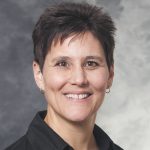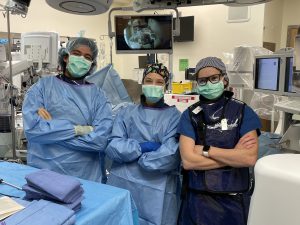 The Department of Urology is nationally recognized as a leader in many disciplines. It has a large innovative surgical practice, broad-based clinical and research programs in adult and pediatric urology, and young, dynamic faculty. We care for a complex and diverse patient population. Your residency is enriched by a healthy, environmentally conscious, family-oriented college town that offers the best in Midwest living.
The Department of Urology is nationally recognized as a leader in many disciplines. It has a large innovative surgical practice, broad-based clinical and research programs in adult and pediatric urology, and young, dynamic faculty. We care for a complex and diverse patient population. Your residency is enriched by a healthy, environmentally conscious, family-oriented college town that offers the best in Midwest living.
Available positions: Four
Length: Five years
ACGME Accredited: Yes
Application deadline: To be considered for the program, application materials must reach our offices by September 30, 2024. We accept applications sent electronically through ERAS. Learn how to apply.
Residency Program Director: Daniel H. Williams IV, MD
Benefits: See stipend and benefits information.
A Resident’s Perspective
Listen in as Dr. Jordan Krieger, a 2022-2023 chief resident at UW Urology, joins UW Urology’s WInnovations podcast host, Dr. Kyle Richards to talk about her experience at UW, the challenges of urology residency training – and how the department’s program stays at the forefront of resident education.
Urology Resident Testimonial
Emily Davidson, MD – PGY-4
(Recorded in 2023 as a PGY-3)
Learn more about the resident experience at UW Urology here.
More about Urology Residency at UW-Madison
Daniel H. Williams IV, MD, Professor, Vice Chair for Education, and Residency Program Director, describes the University of Wisconsin School of Medicine and Public Health Department of Urology residency program.
Program Overview
This is an accordion element with a series of buttons that open and close related content panels.
Clinical Experience
Clinical Experience
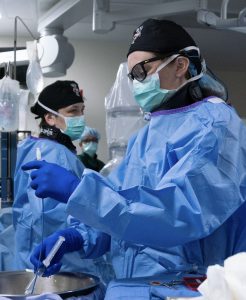
Each year, we perform more than 6,800 urologic diagnostic procedures in the UW Hospital Urology Clinic. At the VA Hospital, we perform another 500 minor and/or diagnostic procedures annually. As a resident, you will receive many opportunities to hone your clinical and surgical skills: you and your colleagues will perform well over two-thirds of UW Hospital’s 1,500 urologic operations each year, as well as most of the VA Hospital urology service’s 175 major procedures. The private practice rotations also give you valuable exposure to a managed care environment.
The department’s clinical expertise includes urologic oncology, endourology, robotics, laparoscopy, pediatric urology, female urology, neurourology, and infertility, among other areas. This is shared with residents through daily faculty interaction in clinic, OR, and daily rounds.
Didactic Curriculum
Didactic Curriculum
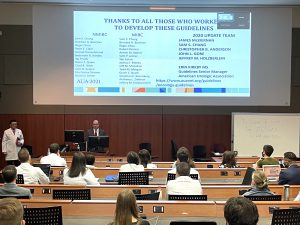 The department’s didactic curriculum is another crucial part of your training. Weekly teaching conferences include grand rounds, resident education conferences, and program rounds. At the Wednesday morning conference, a variety of topics are addressed including journal club, unknown, radiology, and indications conferences. Resident education sessions are robust and play an integral role in the year’s education program. In addition, all urology residents are expected to be attentive and proficient teachers of medical students.
The department’s didactic curriculum is another crucial part of your training. Weekly teaching conferences include grand rounds, resident education conferences, and program rounds. At the Wednesday morning conference, a variety of topics are addressed including journal club, unknown, radiology, and indications conferences. Resident education sessions are robust and play an integral role in the year’s education program. In addition, all urology residents are expected to be attentive and proficient teachers of medical students.
Research
Research
Medical research is an important aspect of your urology residency. Many of the faculty members have basic science or clinical research programs, studying – among other topics – prostatitis, noninvasive methods of kidney and prostate surgery, genetic mechanisms in prostate cancer, the safety and efficacy of a vaccine for recurrent urinary tract infections in women, the effect of the sensory nerve system on bladder function, ureteral physiology, early detection of bladder cancer, and pediatric kidney stone disease.
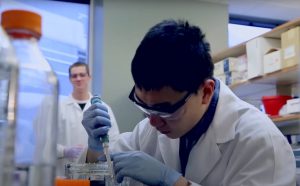 Our department is also involved in many clinical investigations of cancer therapy as part of the UW Carbone Comprehensive Cancer Center. We maintain a collaborative clinical research effort with the Department of Medicine and Department of Pediatrics’ Division of Nephrology on the etiology and treatment of kidney stones. Faculty are participating in cooperative group studies for adult and pediatric urologic malignancies, benign prostatic hyperplasia, endourology and laparoscopic instrumentation, neurourology, and various drug therapies. As a resident, you will be encouraged to become involved in these clinical trials and present your basic and clinical research results at local and national meetings.
Our department is also involved in many clinical investigations of cancer therapy as part of the UW Carbone Comprehensive Cancer Center. We maintain a collaborative clinical research effort with the Department of Medicine and Department of Pediatrics’ Division of Nephrology on the etiology and treatment of kidney stones. Faculty are participating in cooperative group studies for adult and pediatric urologic malignancies, benign prostatic hyperplasia, endourology and laparoscopic instrumentation, neurourology, and various drug therapies. As a resident, you will be encouraged to become involved in these clinical trials and present your basic and clinical research results at local and national meetings.
The residency program in urology fills four positions each year through the American Urologic Association match. Your PGY-1 year consists of six months on the Urology Service and six months of general surgery rotations completed at UW and affiliated hospitals. The four-year urology residency begins in the PGY-2 year, for a total of five years of training.
Lectures and Courses
- Scheduled Lectures
- Uehling-Wear Lecture Series
- Charles and Margaret Lescrenier Lectureship
- Robert F. Schnoes Lecture Series
- Dr. David Paolone Men's Health Visiting Professorship
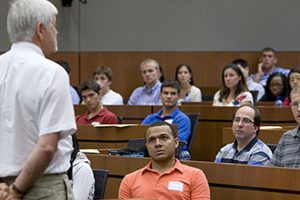 The Department of Urology hosts Grand Rounds on Wednesdays from 7:00 a.m. – 7:45 a.m. followed by Urology Conference on Wednesdays from 7:45 a.m. – 8:30 a.m. Both conferences take place in 1345 HSLC or via Webex for those who choose to join remotely.
The Department of Urology hosts Grand Rounds on Wednesdays from 7:00 a.m. – 7:45 a.m. followed by Urology Conference on Wednesdays from 7:45 a.m. – 8:30 a.m. Both conferences take place in 1345 HSLC or via Webex for those who choose to join remotely.
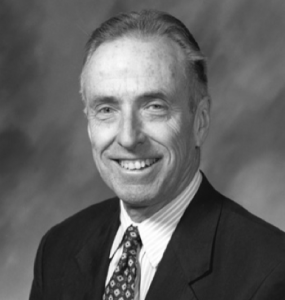 Dr. David T. Uehling was born and raised outside Chicago, and completed his urology training at Northwestern. Following a successful stint as a fellow at Chicago Children’s Memorial Hospital, he joined the staff at the University of Wisconsin in 1965. Clinically, Dr. Uehling developed a statewide practice in pediatric urology, and has served the children of Wisconsin admirably for 40 years.
Dr. David T. Uehling was born and raised outside Chicago, and completed his urology training at Northwestern. Following a successful stint as a fellow at Chicago Children’s Memorial Hospital, he joined the staff at the University of Wisconsin in 1965. Clinically, Dr. Uehling developed a statewide practice in pediatric urology, and has served the children of Wisconsin admirably for 40 years.
Throughout his career, Dr. Uehling distinguished himself in research, with continuous NIHfunding in the treatment of urinary tract infections. In 1983, Dr. Uehling assumed the chair of the Division of Urology at UW-Madison, and has grown the program into one of national standing. Upon stepping down as chairman in 2001, Dr. Uehling continues to serve the Department of Urology as an Emeritus Professor. Dr. Uehling has impacted the lives of many patients, urologists and scientists throughout the world. This meeting in his honor is a small way to emphasize all of his accomplishments.

Charles (Les) and Margaret (Peggy) Lescrenier and Gammex established this endowment in 2010 to support an annual lectureship in the Department of Urology focused on an area of urologic disease. According to Peggy, “Charles’ life was saved in 2002 by surgery to remove a cancerous kidney. Dr. Stephen Nakada was the surgeon and Charles lauded him for saving his life.”
Charles Lescrenier was a radiological physicist, teacher and researcher whose academic career was marked by positions at MD Anderson Hospital in Houston, Yale University, the Royal Marsden Hospital in London, Marquette University and the University of Chicago Medical School. Charles was a Fellow of the American Association of Physicists in Medicine and the American College of Radiology and an honorary member of the American College of Medical Physics. He founded Gammex in 1969 to manufacture a device he invented to align medical imaging equipment using lasers. Charles earned 16 patents over the years and started several companies with Peggy. They have served an extensive list of professional and community organizations by giving their time and as philanthropists with a focus on medical research. Charles died peacefully on May 7, 2011. Peggy still serves on the Department of Urology Advisory Board and remains active as a philanthropist and advocate.

Robert (Bob) and Dolores (Jinx) Schnoes owned Ultrasonic Power Corporation for 27 years. Their company developed, manufactured and sold precision ultrasonic washing equipment to global customers in industries such as aerospace, medical, pharmaceutical and manufacturing. Bob and Jinx were pleased with the outstanding care UW Health provided for Bob and they wanted to make a gift that would help others. In 2006, they established this endowment to provide a margin of excellence through incremental funding for innovative urologic research. Their hope was that this research would provide insights into urologic diseases and treatments, and help find new ways to identify and eliminate cancer cells.
The Robert F. Schnoes Lecture Series Fund was established through a generous donation by Bob and Jinx Schnoes. The income from this fund supports an annual lecture by a visiting professor with expertise in an area of urologic cancer treatment or research. Thanks to this endowment, the Department is able to host nationally prominent clinicians and researchers who share the latest cancer knowledge with UW faculty, residents and medical students.
Thanks to a generous gift from faculty member David R. Paolone, MD, the University of Wisconsin Department of Urology established the Dr. David Paolone Lecture Series in Men’s Health Visiting Professorship.
Click here to view past and upcoming lectures.

